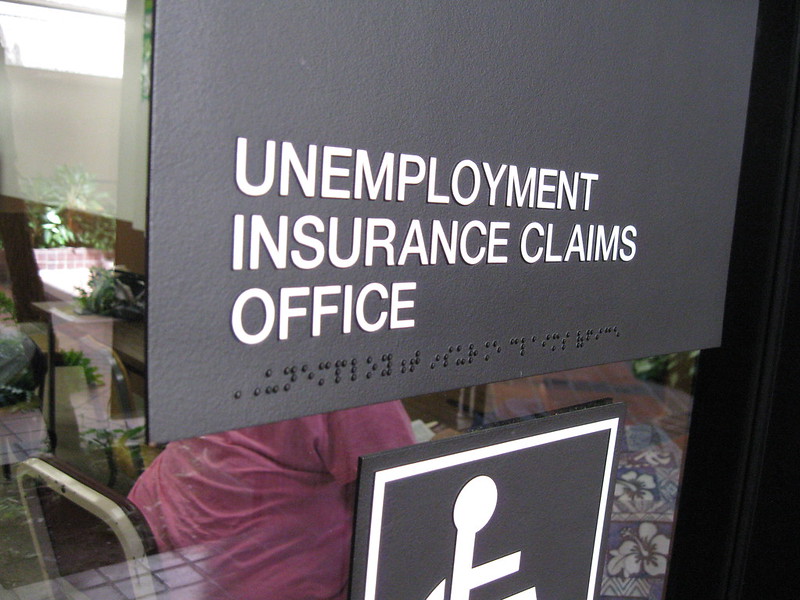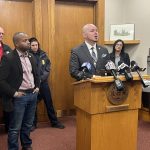Republican Bills Would Change Unemployment Insurance, Licensing
"Solutions in search of problems," says Sen. Melissa Agard.

Unemployment Insurance Claims Office. Photo by Bytemarks (CC-BY).
Amid a variety of bipartisan bills that produced unanimous votes in both houses of the Legislature Wednesday, Republicans in the state Senate passed five bills changing the state’s unemployment insurance system while the Assembly’s GOP members passed seven bills imposing new requirements on the state’s occupational licensing system.
The unemployment bills in the Senate passed along party lines, as they did earlier in the Assembly. Gov. Tony Evers is expected to veto them.
“These bills are solutions in search of problems,” said Sen. Melissa Agard (D-Madison) during a brief floor speech before the first vote. “This is a cynical distraction from the work that we should be doing.”
In the Assembly, the occupational licensing bills also passed along mostly party lines, reflecting what has been a running argument between the Democrats and the Republicans over backlogs that have left some people stranded for months waiting on licenses they must have to practice their profession.
For more than a year Republican lawmakers have blamed the Wisconsin Department of Safety and Professional Services (DSPS) for not doing enough to address complaints about lengthy professional licensing delays. In response, the department and its defenders have pointed to the workload at the department, where license applications have more than doubled in the last decade without a commensurate increase in staff or funding.
The bills came out of a study committee the Legislature’s leaders convened in 2022.
The occupational licensing program is funded by fees collected from license applicants, but the department cannot use that money to expand its staff unless the Legislature first authorizes it to do so. Earlier this year Wisconsin Watch reported that DSPS has about $47 million in fee revenue that the department cannot use because it doesn’t have that permission.
DSPS “has forty-plus million dollars in their coffers that they don’t have access to,” said Rep. Supreme Moore Omokunde (D-Milwaukee), who sat on the 2022 study committee. “If you’re a nurse, if you are an architect, if you are a social worker, you’re paying your fees into the department,” he said. DSPS “should have the resources it needs to do its job.”
Evers proposed adding 20 full-time employees to the licensing program in the 2019-21 budget and 12 additions in the 2021-22 budget. Republican lawmakers authorized two additional positions over the last four years.
The governor’s 2023-25 budget proposal calls for 80 additional DSPS employees overall, including 16 to process license applications and 14 to provide customer service. The Joint Finance Committee is scheduled to vote on the department’s budget when it meets Thursday.
Assembly Democrats signaled at the start of Wednesday’s debate how they would vote on the licensing legislation. “This package of bills that is before us today is not about lifting up Wisconsin’s workers,” said Rep. Kalan Haywood (D-Milwaukee).
Haywood noted that when the study committee was created, the Republicans rejected the Democrats’ nominees for members of the public to serve on the committee. “Throughout this process, your partisan agenda has been injected at every step,” he said.
Several of the bills the Assembly passed Wednesday would require DSPS to track a variety of metrics in the occupational licensing administration, such as how long it took to process license applications, and included requirements to report that information to the Legislature or post it on the department’s website.
In testimony that DSPS submitted for public hearings on the legislation, the agency said most of the measures would impose new costs and new personnel requirements on the agency, neither of which were addressed in the bills.
“This is about providing data, giving information to this legislative body, giving information to the public at large, to know what is going on at DSPS,” Rep. Shae Sortwell (R-Two Rivers), the vice-chair of the study committee and lead author of the legislation, said on the Assembly floor Wednesday.
After the first three bills were voted on and passed on party-line or near-party-line votes, Sortwell accused the Democrats of working “to make a game out of people’s occupational licenses here on the floor” and “trying to make some sort of point in the budget.”
His voice rising, he added that if Democrats didn’t vote in favor of the new regulations for DSPS, “I would say that when the DSPS comes up for a vote tomorrow [in the Joint Finance Committee], I wouldn’t give them another dime.”
That comment came before the vote on the one bill in the group for which DSPS had expressed support: AB-203, which would tighten and clarify language about occupational license renewal. DSPS said the bill would not strain its existing resources.
Sortwell’s comment prompted a retort from Rep. Katrina Shankland (D-Stevens Point). “To threaten that if there’s not bipartisanship and a bipartisan vote on a bill, threatening total funding of a state agency — that should be front page headlines,” Shankland said.
“I was going to vote yes on this. I still am,” she added. “But I want you to understand you don’t get to control our votes by telling us you will take away state funding. It’s not OK.”
Unlike the rest of the bills, it passed 84-12, with 21 of the Assembly’s 35 Democrats voting in favor.
Of the remaining bills,
- AB-200 would require the DSPS to report a list of statistics related to license applications and renewals, with breakdowns by individual profession and data such as how long the agency took to complete processing.
- AB-201 would require the agency to post application data on its website.
Both bills passed 63-33. Rep. Jill Billings (D-La Crosse) was the only Democrat to vote for either measure.
The remaining four passed on party lines, 62-34. They were:
- AB-202 would allow DSPS to streamline its handling of conviction records, one of the steps that the agency’s licensing investigators take before issuing a license.
- AB-204 would change two-year renewal periods for occupational licenses to four years.
- AB-205 would expand the provision of temporary credentials to professionals licensed in another state, to include most other licensed professions.
- AB-206 would require DSPS to compare all of its health care credential programs with other states to determine which ones could be made reciprocal, and with which states, and then post that information on the department website.
Senate unemployment insurance bills
The unemployment insurance bills that the Senate passed Wednesday with only Republican votes all originated in the Assembly. Evers vetoed several similar pieces of legislation in the 2021-23 session.
- AB-147 would increase the grounds for which a person fired for misconduct can be disqualified from collecting unemployment, require DWD to audit at least half of required work searches, and give the Legislature’s Joint Finance Committee a veto over future federal jobless pay enhancements, such as those provided in the first year and a half of the COVID-19 pandemic.
- AB-149 would deny a week’s benefit for UI recipients accused of declining a job interview, failing to respond to an employer’s job interview offer or failing to show up to an interview.
- AB-150 would change the name of “unemployment insurance” to “reemployment assistance.” The bill would require DWD to develop lists of potential jobs for each recipient, require recipients to apply for jobs on those lists and require DWD to begin drug tests for jobless pay recipients who would be cut from the program if they flunk.
- AB-151 would require all job training, placement and other workforce development programs in every state agency to be assessed based on employment statistics and earnings of program graduates as well as other metrics.
- AB-152 would directly authorize the Wisconsin Department of Administration to transfer workers across state agencies to DWD when needed to meet heightened demand to process claims.
Bitter divide in the Legislature over unemployment, licensing was originally published by the Wisconsin Examiner.
If you think stories like this are important, become a member of Urban Milwaukee and help support real, independent journalism. Plus you get some cool added benefits.





















